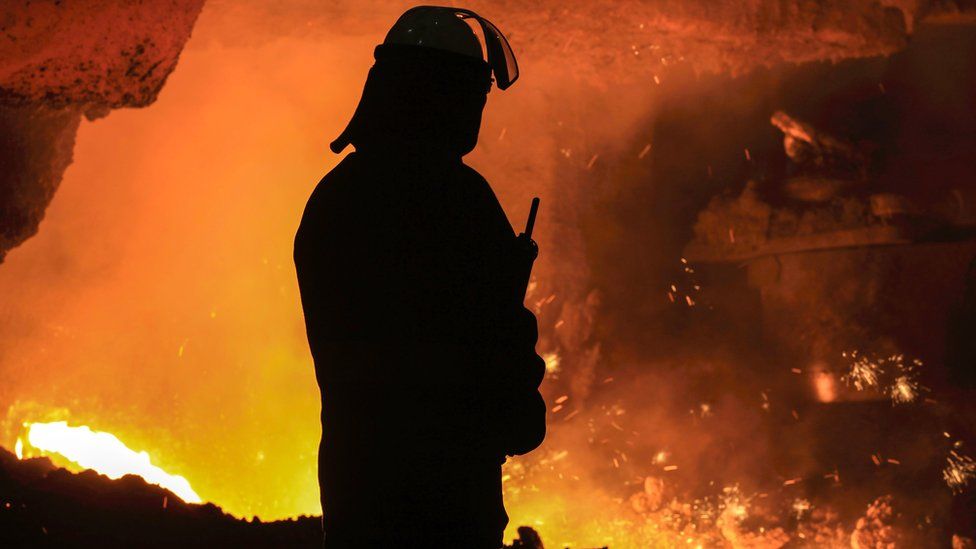The UK government has made a last-ditch decision to overrule its official post-Brexit trade advisers to extend protections on certain steel products.
The protections make it more expensive for British companies to buy foreign steel above certain quantities.
Trade Secretary Liz Truss said the move would defend jobs in the UK’s steel sector amid uncertainty due to Covid.
Labour welcomed the decision, which it claimed was a U-turn on the government’s former position.
The protections, inherited by the UK after Brexit, limit the amount of steel that can be purchased without import taxes and were due to expire on Wednesday.
The EU introduced the safeguards on a total of 19 products in 2019, whilst the UK was still a member.
The bloc introduced them in response to US President Donald Trump imposing import taxes – or tariffs – on steel from China and elsewhere, which sparked fears the market would be flooded with cheap steel.
Following Brexit, the UK government has now said it will continue with the protections – originally due to end on 30 June – for 15 of the 19 products.
This is five more than recommended by its post-Brexit advisory body, the Trade Remedies Authority (TRA), after a review of trade data last month.
The authority had argued it was only justified for the UK to keep the protections in place for 10 out of the 19 products.
Separately, the 27 remaining EU countries have decided to continue with the measures for all 19 products, for a total of three years.

Hours before the UK measures were due to expire on Wednesday, Ms Truss announced emergency legislation to override the TRA’s recommendations.
Under the new plans, the UK will accept the authority’s advice for a three-year extension to the measures on 10 products.
But in addition, import limits on five more products will remain for one year. Imports above these limits will be subject to a 25% tariff.
Ms Truss said the move would “further defend the UK steel industry,” with Covid and continued trade restrictions putting the sector “at an unacceptable disadvantage”.
She added it would allow the industry to “appeal” the TRA’s recommendations, with more recent data gleaned during the Covid crisis.


Brexit is turning out to be a trial and error process.
In this case, it’s around the role of the Trade Remedies Authority, which recommends measures to protect domestic industries from changes in global trade patterns.
The independent body has only been fully operational for a month, and already the government has overruled it once and ordered a review of the entire system.
Ministers discovered they could only accept or reject the authority’s recommendations in full, which limited their room for manoeuvre in politically sensitive industries like steel.
A harsh critic could say that Britain’s post-Brexit trade policy is in disarray just six months after cutting formal ties with the EU.
A more sympathetic observer would suggest the country’s on a learning curve, which means a few policy tweaks are inevitable, and that jobs are being saved in this case.
But this is a also protectionist measure which will have some free-marketeers in the Tory party wondering if the government has the stomach to turn the UK into a lean, mean trading machine.
UK Steel’s Director-General Gareth Stace welcomed the government’s move, adding that accepting the TRA’s recommendation “would have been unthinkable, and we would have certainly seen job losses”.
He told BBC Radio 4’s Today programme that data had been “inconsistent,” but the sector “had seen increases in imports” for the five products where ministers have kept protections.
“We knew there would be injury if those five categories just disappeared,” he added.
Labour’s shadow international trade secretary Emily Thornberry also welcomed the move, which she called a “U-turn from the government”.
She claimed Labour MPs representing steelmaking areas had “successfully forced their last-minute reversal” through pressure on ministers.
She also welcomed Ms Truss’s “belated acceptance” of the need to review the TRA, which she said “must be urgently reformed”.
Vaughan Gething, economy minister in the Labour-led Welsh government, also welcomed the extension, adding it had come from an “11th hour decision to listen to our concerns”.
Also speaking to Today, Business Secretary Kwasi Kwarteng said extending the protections was justified by “the need to have national resilience” in certain sectors.
“In other parts of the economy – if you look at the digital economy, if you look at companies that operate with the internet – there is much greater scope for free trade,” he added.



No comments:
Post a Comment
Note: only a member of this blog may post a comment.